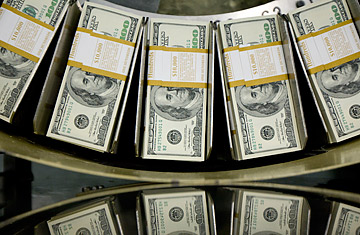
Pity the campaign-finance-reform activist. For years he's fought to expel big money from politics and shine a spotlight on who's funding campaigns. But less than a decade after that shining moment for the campaign-finance-reform movement, the 2002 Bipartisan Campaign Reform Act (known as McCain-Feingold, after its two chief Senate sponsors, John McCain and Russ Feingold), its successes are unraveling, and its prospects look dimmer by the day.
The 2010 elections will likely see more than $300 million be spent by conservative independent groups that disclose little or nothing about their donors. (Pro-Democratic unions will spend perhaps half that, though their funds come from rank-and-file members, not outside donors.) That comes on the heels of a January 2010 Supreme Court ruling in the Citizens United case that declared that corporations and unions are entitled to spend their money on direct electioneering — meaning to help or defeat candidates — as a function of their free speech. Campaign reformers say the Citizens United decision has effectively served as a green light for a new torrent of corporate cash to be funneled into the political system through intermediary groups like the U.S. Chamber of Commerce, which take advantage of legal loopholes to keep their donors anonymous.
That's a far cry from eight years ago, when after years of failed attempts, Congress passed the Bipartisan Campaign Reform Act. That law imposed the strongest new limits on political money since the mid-1970s, including a ban on so-called soft-money contributions to the national parties. Before McCain-Feingold, Congressmen, Senators and even the President could hit up donors for six- and seven-figure contributions to, say, the Democratic National Committee. (The thirst for soft money was what drove Bill Clinton to effectively rent out the Lincoln Bedroom to donors.)
When McCain-Feingold passed, cynics predicted that big political money would simply find other outlets — and they were right. Because of that law, political parties can no longer accept donations above $30,400 per year. So the massive donations have simply moved to nonprofit groups like the Chamber of Commerce and the Karl Rove–advised American Crossroads. Under the flimsy premise that they provide some service improving the "common good and general welfare of the community" — not outright electioneering — such groups can accept unlimited donations without revealing anything about their donors.
The good news is that politicians themselves are no longer allowed to grovel for big donations from people to whom they may feel indebted. The bad news is that billionaires and even big corporations could be funding these groups with the goal of pressing narrow agendas from the shadows. (The New York Times appears to have exposed just such a scheme on the part of an Iowa ethanol executive targeting House Agriculture Committee members.) As White House press secretary Robert Gibbs said on Meet the Press last weekend, "Nobody knows who those donors are. Nobody knows what their political agenda is. What do they want from the next Senator or from the next Congressman?"
So where can reformers go from here? One sliver of short-term hope lies with the Disclose Act, a measure that addresses fears about shadow money by requiring corporations, unions, trade associations and nonprofit groups to disclose their donors in federal elections. That law passed the House this summer but stalled in the Senate after Democrats came up one vote short of breaking a Republican filibuster. Reformers are hopeful that the bill can pass if Congress brings it up during a lame-duck session after the November elections. A chief Republican complaint, after all, was that the bill was a Democratic effort to change the rules of the 2010 election in the middle of the game — an objection that would presumably be untenable in the days just after Nov. 2.
